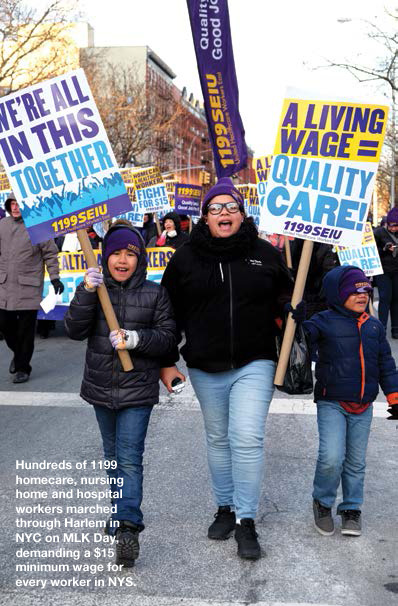On the Frontlines of the Fight For $15
February 25, 2016
Homecare members of 1199SEIU flexed their political muscles last year, as they took part in major actions against the growing inequality that threatens the well being of millions as well as our democracy.
“I took part in many actions last year because I want to continue to take care of people who need me,” says Alimamy Bakarr Barrie, a home health aide at Stella Orton Home Care Agency in Staten Island.
Barrie, who was born and raised in the West African nation of Sierra Leone, says he wants dearly to continue his work, but that it becomes increasingly difficult to do so while earning just $10 an hour.
His pay is typical for an industry in which some 90 percent of the workforce is female. A large percentage of those women are also immigrants. And many are heads of their households.
Barrie lives in Staten Island with his wife and five children. The oldest is 25 and the youngest, nine. He wants more for his wife and children.
“I’ve marched right here in Staten Island,” he proudly declares. “And I’ve gone to Manhattan, Albany and even Baltimore to fight for the $15 minimum.”
At each action, Barrie stresses the importance of his work. “I don’t believe that nothing is as important as taking care of others,” he says. “But it is also difficult giving clients the help that they need.”
Statistics show that the job of a home health aide is one of the nation’s most dangerous as well as one that is the most poorly compensated. Homecare also is the fastest growing sector of the healthcare industry, and its growth will continue apace as baby boomers continue to retire.
“I believe our elders and others like our military veterans who’ve sacrificed their lives for our country deserve the very best of care,” Barrie stresses. “We are the first line of care for them. And I don’t mean helping with just the usual like hygiene, housekeeping, but also helping with physical, social and emotional pain.
“I have taken care of military veterans who were in extreme emotional pain. It’s gratifying for me to help to comfort them and even help talk them back to some happiness.”
Barrie, points out, as does so many other homecare workers, that he spends far more time with patients than their families often do. “In fact, we spend more time with them than anyone else in the healthcare industry. Doctors usually don’t spend much time with them and neither do nurses. We work eight, 12 hours and often sleep in clients’ homes.”
Unfortunately, the work and commitment of the aides is unappreciated, Barrie believes. “We may be good Samaritans with great passion, but often the loved ones of our clients feel we don’t do enough.”
Barrie acknowledges that others in the industry also need help. The $15 minimum wage would also help some workers in hospitals, nursing homes, clinics and pharmacies. It also would strengthen the economy and help address economic inequality in New York, one of the most unequal states in the country.
“We do so much, yet are paid so little,” Barrie says. “With today’s cost of living, especially in New York, it is so hard to survive. Even $15 an hour is not enough, but I know it is an important first step.”
But Barrie also understands that the legislators in the statehouses and in Washington will determine his and other homecare workers’ fate. “I know our Union is fighting to change this. And I know they need each of us to be active,” he says.
“I will continue doing my work and give my love to my patients, but I will also continue to go forward in the fight for $15 until our leaders hear us and answer our call.”


